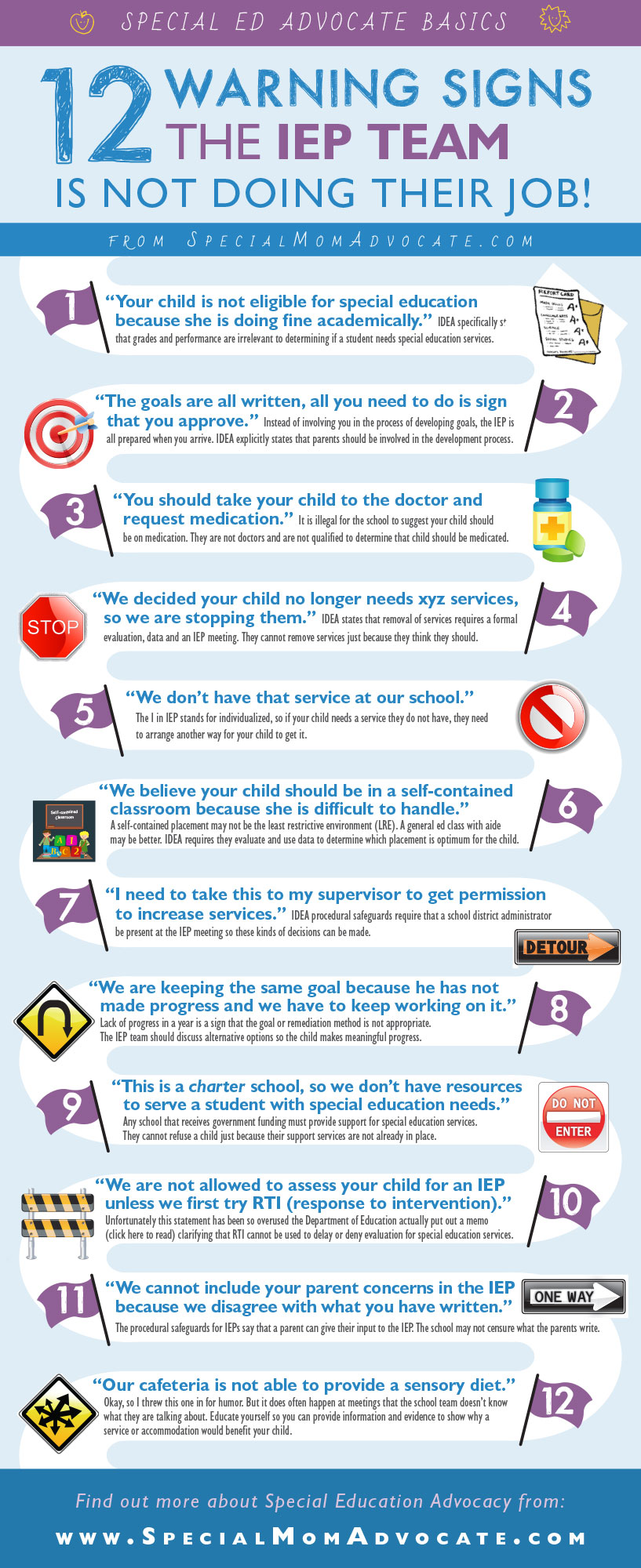 The IEP Team is suppose to help support your child, but sometimes their approach can be misleading. Knowing the law is key when advocating for your child. In my book, Special Ed Mom Survival Guide, I spend considerable time helping you learn about the law and how to apply it. In attending many IEP meetings as a special education advocate, I realized that the schools don’t quote the law when the deny services. Their information is hidden in messages that sound legitimate.
The IEP Team is suppose to help support your child, but sometimes their approach can be misleading. Knowing the law is key when advocating for your child. In my book, Special Ed Mom Survival Guide, I spend considerable time helping you learn about the law and how to apply it. In attending many IEP meetings as a special education advocate, I realized that the schools don’t quote the law when the deny services. Their information is hidden in messages that sound legitimate.
Here are 12 phrases I often hear that are really the IEP Team’s way of skirting around their obligation to provide services.
- “Your child is not eligible for special education because she is doing fine academically.” IDEA specially states that grades and performance are irrelevant to determining if a student needs special education services.
- “The IEP goals are all written, all you need to do is sign that you approve.” Instead of involving you in the process of developing goals, the IEP Team is all prepared when you arrive. IDEA explicitly states that parents should be involved in the development process.
- “You should take your child to the doctor and request medication.” It is illegal for the school to suggest your child should be on medication. They are not doctors and are not qualified to determine that child should be medicated.

- “We decided your child no longer needs xyz services, so we are stopping them.” IDEA states that removal of services requires a formal evaluation, data and an IEP meeting. They cannot remove services just because they think they should.
- “We don’t have that service at our school.” The I in IEP stands for individualized, so if your child needs a service they do not have, they need to arrange another way for your child to get it.
- “We believe your child should be in a self-contained classroom because she is difficult to handle.” A self-contained placement may not be the least restrictive environment (LRE). A general ed class with aide support may be better. IDEA requires them to evaluate and use data to determine which placement is optimum for the child.

- “I need to take this to my supervisor to get permission to increase services.” IDEA procedural safeguards require that a school district administrator be present at the IEP meeting so these kinds of decisions can be made.
- “We are keeping the same goal because he has not made progress and we have to keep working on it.” Lack of progress in a year is a sign that the goal or remediation method is not appropriate. The IEP team should discuss alternative options so the child makes meaningful progress. It’s important to organize all information in an IEP binder so you are ready to show evidence of progress.
- “This is a charter school, so we don’t have the resources to serve a student with special education needs.” Any school that receives government funding must provide support for special education services. They cannot refuse a child just because their support services are not already in place.

- “We are not allowed to assess your child for an IEP unless we first try RTI (response to intervention).” Unfortunately this statement has been so overused the Department of Education actually put out a memo clarifying that RTI cannot be used to delay or deny evaluation for special education services. Click here to read the memo. Assessment for an IEP and RTI can be done simultaneously. This way if the RTI is not successful, the child will get support as soon as possible.
- “We will not accept your parent concerns for the IEP because we disagree with what you have written.” The procedural safeguards for IEPs say that a parent can give their input to the IEP. The IEP Team may not censure what the parents write. Get a copy of your state procedural safeguards (parent rights).
- “Our cafeteria is not able to provide a sensory diet.” Okay, so I threw this one in for humor. But it does often happen at meetings that the school team doesn’t know what they are talking about. Educate yourself so you can provide information and evidence to show why a service or accommodation would benefit your child.
Infographic with 12 Warning Signs IEP Team is Not Doing Their Job!
I created the following infographic that you can save as a reference. If you share it on a blog or other site, please link it back to this page so the original source is referenced.
ABOUT THE AUTHOR:
Bonnie Landau is a professional counseling and holistic therapist in Ventura County, California. Her specialities include therapy for autism, therapy for ADHD, and therapy for parenting who have kids with autism or ADHD or other neurodivergence. She changed careers from graphic design to counseling with the goal of helping struggling parents of kids with ADHD, autism, or other neurodivergence find strategies and solutions to help their children succeed. Bonnie is also the author of Special Ed Mom Survival Guide: How to Prevail in the Special Education Process and Find Life-long Strategies for You and Your Child.



